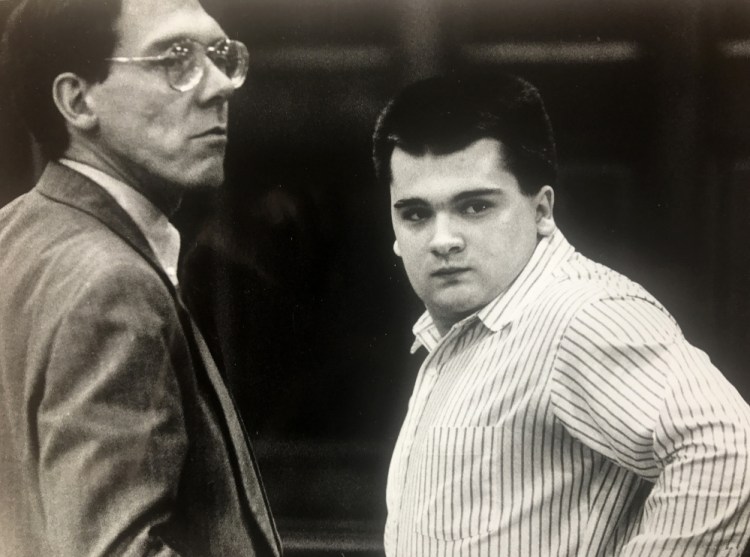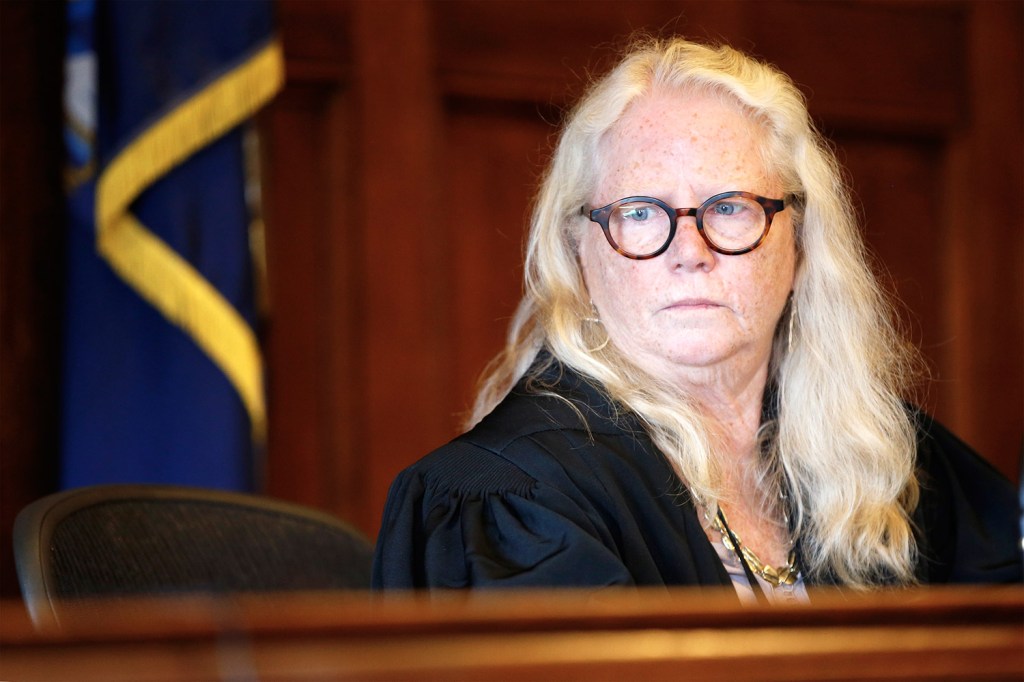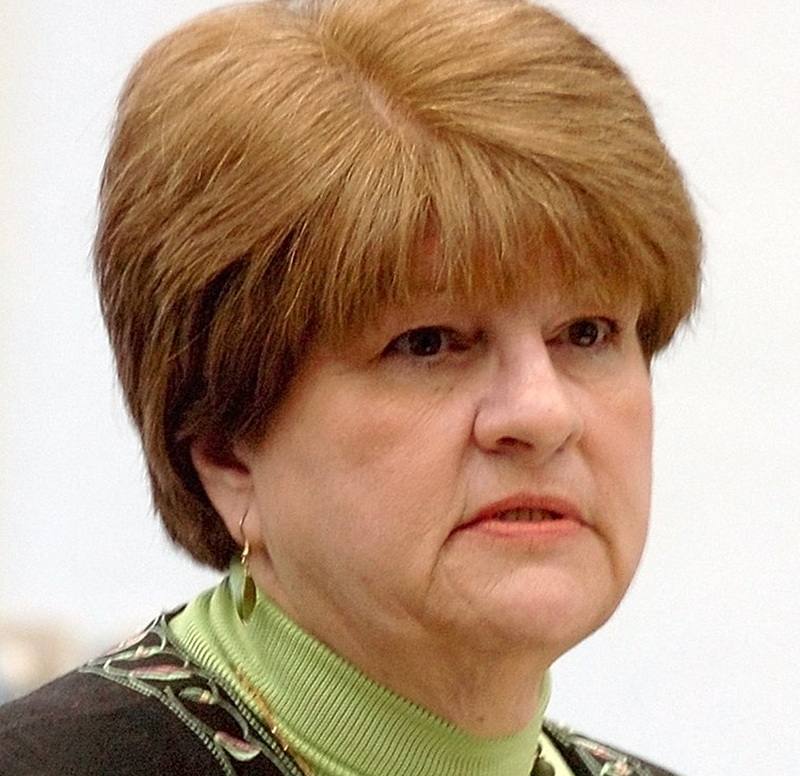The judge presiding over the case of Anthony Sanborn Jr. has ruled that his attorneys and lawyers for the state must be given outtakes from interviews that two broadcasters conducted with the former assistant attorney general who successfully prosecuted Sanborn for murder in 1992.
The order issued Friday by Justice Joyce Wheeler came after she evaluated tapes from the Maine Public network and WGME-TV in private and determined that they merited disclosure because they are relevant to Sanborn’s attempt to prove his innocence.
Although the content was not revealed in the order, Wheeler wrote that outtakes from the interviews with Pamela Ames would be of use to Sanborn, and could be used to call Ames’ credibility into question if she were to take the witness stand. Wheeler ordered the two stations to give Sanborn’s attorneys and those for the state the material edited from the interviews, but she forbid the attorneys from disseminating it.
Benjamin Piper, an attorney for the firm that represents both stations in the dispute, said he had spoken with Maine Public and the station is considering its next move. “They’re disappointed with today’s ruling and are exploring their options going forward,” he said.
Piper said he was unable to reach WGME-TV, and the station did not return a message from a reporter seeking comment Tuesday afternoon.
Piper’s firm, Preti Flaherty, also represents the Portland Press Herald/Maine Sunday Telegram on issues involving media law.
A spokesman for the state Attorney General’s Office, which is representing the state in the case, had no comment on the order.
The interviews with Ames, now a criminal defense attorney in Waterville, were conducted in April after Wheeler released Sanborn from the Maine State Prison on bail, following filings by his attorney alleging that Ames and Portland police detectives colluded to manipulate witness testimony and hide exculpatory evidence in order to win a conviction.
Ames, who left the Attorney General’s Office for private practice in the mid-1990s, granted separate interviews to Maine Public and WGME-TV.
In the portions of the interviews played on air, Ames vigorously denied any wrongdoing and insisted on Sanborn’s guilt, and criticized Wheeler for releasing him on bail before hearing more facts presented by the state.
RIGHTS OF CRIMINAL DEFENDANT PREVAIL
The stations resisted the subpoena by Sanborn’s attorney, Amy Fairfield, to turn over the outtakes. They argued that providing material that was not broadcast because it was removed during the editing process would have a chilling effect on sources coming forward in the future, and would set a troubling precedent in which aggrieved interview subjects could use the court system to force the disclosure of unpublished material.
But in a three-paragraph order, Wheeler declared that in evaluating the competing constitutional interests of First Amendment media freedoms with Sanborn’s Sixth Amendment right to confront his accusers, Sanborn’s position as a criminal defendant prevails.
“The outtakes of Attorney Ames’ interviews are an invaluable and irreplaceable opportunity for the petitioner and the court to observe Ames’ demeanor and hear an unedited version of how the case against Anthony Sanborn was put together in the lead prosecutor’s own words with any subtle nuance that it may reveal,” Wheeler wrote. “Furthermore, how law enforcement put together the case against Sanborn is a matter of grave public concern striking at the heart of public confidence and trust in the power of the state.”
Wheeler noted that Ames may be a prominent witness at Sanborn’s post-conviction hearing, scheduled for late July and early August, that she is “predictably hostile” in the news footage and that the outtakes represent a basis for her impeachment if she were to take the witness stand.
Sanborn was 16 in 1989 when Jessica L. Briggs, also 16, was brutally murdered on Portland’s waterfront. Her body was pulled from Casco Bay after police found large amounts of blood on the Maine State Pier.
Briggs and Sanborn dated briefly weeks before she was killed. He was convicted of her murder and sentenced to 70 years in prison.
Adria LaRose, an attorney at Eaton Peabody in Bangor who focuses in part on media law and has no connection to the Sanborn case, said Maine’s protection against a court ordering a reporter to divulge source information does not apply in this case because the source is not confidential.
“(Ames’) interview aired on TV and the so-called ‘reporter’s privilege’ does not apply,” LaRose said.
She went on to say that although some states, including Maine, also recognize that reporters still have First Amendment rights to non-confidential information such as unaired portions of an interview, the court must weigh those rights against Sanborn’s Sixth Amendment rights to confront and cross-examine witnesses.
“The court here, citing earlier Maine state and federal court decisions, ruled that Mr. Sanborn’s rights outweigh the media’s rights,” LaRose said.
DEFERENCE TO RIGHTS OF MEDIA
These competing interests have vexed courts for years, said Laurie Ruskin, a business litigator at the Boston-based firm Sweder & Ross who has nearly 20 years of First Amendment litigation experience.
Had the case at hand been civil in nature, where the stakes are lower than Sanborn’s freedom, Ruskin suspected that the judge may have measured the competing constitutional interests differently. Although it is not unheard of for a court to order media organizations to produce information, much more often it is the press that uses the courts to request the disclosure of documents or other information.
“One hesitates and approaches in a humble fashion whenever you’re compelling the press to do anything,” Ruskin said. “I wouldn’t be surprised that what weighs even greater is an issue involving physical liberty. If this judge says, ‘Wow, this information could make or break, be a deal breaker for a man’s liberty, than from this judicial frame of mind, I may have to very carefully, very carefully, very deferentially, step on the toes of the press.’ ”
Matt Byrne can be contacted at 791-6303 or at:
Send questions/comments to the editors.






Success. Please wait for the page to reload. If the page does not reload within 5 seconds, please refresh the page.
Enter your email and password to access comments.
Hi, to comment on stories you must . This profile is in addition to your subscription and website login.
Already have a commenting profile? .
Invalid username/password.
Please check your email to confirm and complete your registration.
Only subscribers are eligible to post comments. Please subscribe or login first for digital access. Here’s why.
Use the form below to reset your password. When you've submitted your account email, we will send an email with a reset code.